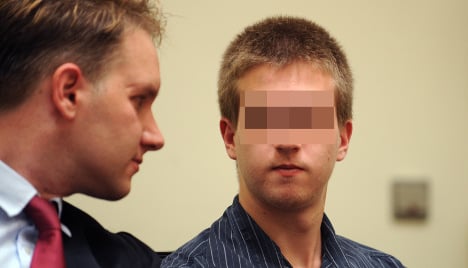In a crime that shocked the nation last September, Sebastian Leibinger, 18, and Markus Schiller, 19, allegedly beat and kicked Brunner to death after the 50-year-old businessman intervened to protect a group of children.
But on Tuesday, Schiller claimed Brunner had thrown the first punch and only then did the teenager lose control and start beating the man.
Schiller said he knew that the way he had reacted was wrong and that he was “forever sorry” for the manager’s death.
Schiller claimed he had experienced a “blackout” after Brunner threw the first punch, at which point Schiller became enraged and let fly his attack. He admitted punching Brunner and could not rule out having kicked the man, but insisted he could not recall further details.
“I must have had a full blackout,” he told the court.
In a statement read by his lawyers, Schiller also said he could not recall the particulars of his interview by police.
“I wish I could help explain my horrible actions,” he said, explaining he could not remember due to the considerable amount alcohol he had consumed.
Schiller told the court he drank five beers and half a bottle of vodka before noon on the day of the crime.
Judge Reinhold Baier has set nine hearing days for the trial. Some 53 witnesses and four experts are expected to give evidence. Brunner’s father is also involved as a joint-plaintiff – a common arrangement in German criminal courts that aims to ensure families of victims are taken into account.
If convicted of murder, Schiller faces life imprisonment. Because he was a minor at the time, Leibinger faces a maximum of 10 years in jail.
The two teenagers are accused of beating and kicking Brunner to death on September 12 last year on the Solln S-Bahn station in Munich. The 50-year-old businessman had intervened on a train to protect a group of children whom the young men were trying to bully out of €15.
But Leibinger told the court on Tuesday they had merely wanted to frighten the children for allegedly mocking him and his companion.
Brunner, stepped off the train with the children at Solln station to keep guard over them. At that point, the violence escalated, though the exact reasons remain unclear – as does the question of who threw the first punch.
What is alleged, however, is that Schiller and Leibinger continued to hit and kick Brunner even as he lay on the ground. He died shortly afterwards from his severe injuries at the Großhadern hospital.
The third youth, Christoph T., who did not take part in the beating but egged his friends on, was sentenced in April to 19 months’ jail.
Ten months after Brunner was killed, the trial got underway but was almost immediately halted when the defence questioned the make-up of the Munich court.
Leibinger, 18, entered the court with downcast eyes, nervously rubbing his hands together, according to the website of daily Süddeutsche Zeitung. He wore a white, short-sleeved shirt, trendy jeans and new black sneakers. On his right wrist he wore a coloured band.
Schiller wore a shirt too big for him, giving him a scrawny appearance, the paper reported. He also looked at the floor, with a pallid face, sitting motionless.



 Please whitelist us to continue reading.
Please whitelist us to continue reading.
Member comments